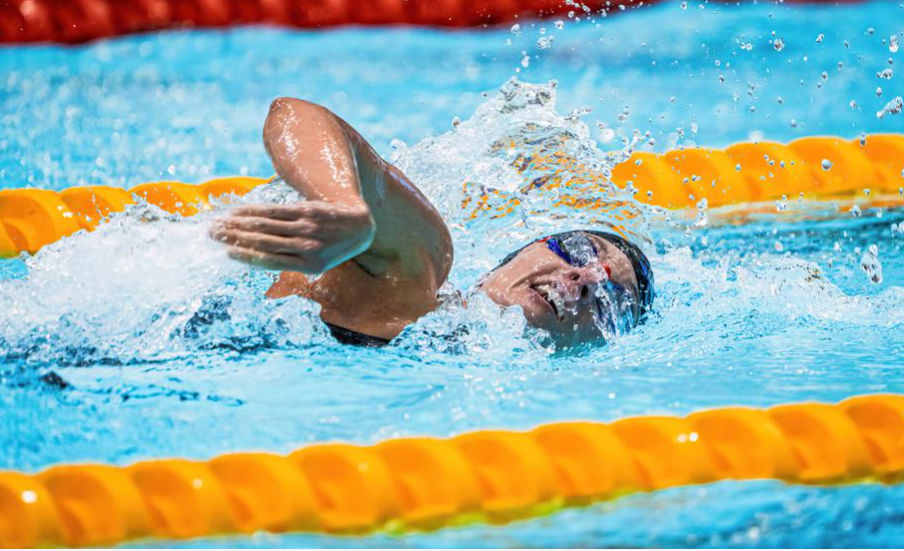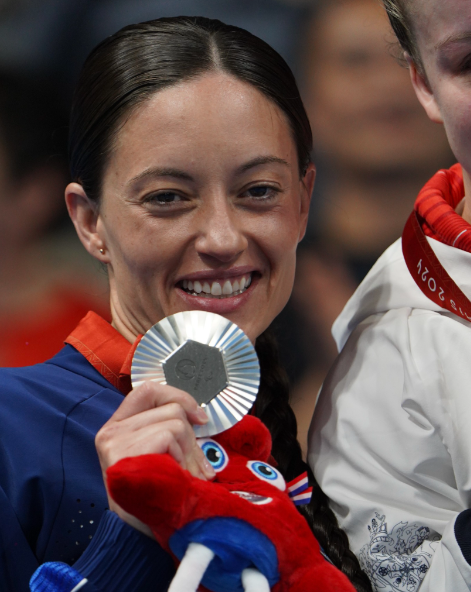
UPDATE I:
U.S. Army Sgt. 1st Class Elizabeth Marks (below) has now won her second silver medal at the 2024 Paralympic Games in Paris, France. She won it in the Women’s 200-meter swimming.

UPDATE II:
Army Veteran Staff Sergeant Jason Tabansky defeated China’s Han Guifei to win Gold in Paralympic Archery
UPDATE III:
Army Veteran Specialist Mason Symons won Silver with the USA Wheelchair Rugby Team. Japan won Gold.
Original Post:
If you were impressed, excited, delighted by the 2024 Paris Olympics, you will be inspired, awed, by the 2024 Paris Paralympics that started Wednesday, August 28 and will continue through Sunday, September 8.
The Paralympics give an incredibly special group of athletes with an impairment the opportunity to compete and shine in world class sports.
Some trace organized sports for athletes with an impairment as far back as 1888 when sports clubs for the deaf were in existence in Berlin.
More recently, in 1944, a Dr. Ludwig Guttman opened a spinal injuries center at the Stoke Mandeville Hospital in Great Britain to assist the substantial number of injured World War II veterans.
This rehabilitation program evolved into rehabilitation sport and, in 1948 – at the Stoke Mandeville Games – into competitive sport when 16 wheelchair service members competed in archery.
Out of this arose the International Stoke Mandeville Games held in 1952 at the Stoke Mandeville Stadium in Aylesbury, England, featuring British and Dutch ex-servicemen and women.
The Games impressed the Olympic community so much that they not only awarded Dr. Guttman the Fearnley Cup “for his outstanding contribution to the Olympic ideal,” but held the first Paralympic Games in Rome, Italy, in 1960 featuring 400 athletes from 23 countries.
Since then, the Summer “Paralympics” have been held every four years. The first Winter Paralympics were held in Sweden in 1976, and as with the Summer Games, have been held every four years.
Since 1960, numerous national and international organizations have stepped up to identify, support, train, encourage, provide opportunity, and qualify thousands of athletes with impairments to a slot in the Paralympics.
In the United States, the United States Olympic & Paralympic Committee (USOPC) manages both Olympic and Paralympic sport and is responsible for sending the U.S. Paralympic Team to the summer and winter Paralympic Games.
Along with several other outstanding organizations, the USOPC supports and rehabilitates veterans and active duty military personnel who have been injured and prepares to achieve their dreams at the Paralympics.
For example, the Paralympic Military Program, launched by the USPOC in 2004, “uses Paralympic sport opportunities to support wounded, ill and injured American service members and veterans, including those with amputations, traumatic brain injuries and visual impairments. Through camps and clinics held year-round across the country, service members and veterans are introduced to Paralympic sport techniques and opportunities, including local and regional competitions, and are also connected to ongoing Paralympic sport programs in their communities.”
One program, the DoD-sponsored annual multi-sport “Warrior Games,” has been instrumental not only in giving wounded service members and veterans the opportunity to train and compete in adaptive sports as part of their “recovery journeys,” but has also been a prime source of athletes at the Paralympics. Another program, the U.S. Army World Class Athlete Program, also assists outstanding soldier-athletes and prepares them to attend both the Olympic and Paralympic Games.
This year, around 4,400 athletes – including a record 1,983 women – from 168 countries are competing in 22 individual and team sports, ranging from blind football (soccer) to sitting volleyball and wheelchair basketball to para-archery to para-triathlon and para-equestrian.
Two of the 22 Paralympic sports — goalball and boccia – do not have an Olympic equivalent.
Goalball is played on an indoor court the size of a volleyball court with goals set up at each end. Teams of visually impaired or blind players (wearing eyeshades to ensure fairness) take turns rolling a ball containing bells toward the opposing goal while the defending team’s players act as goalkeepers.
In boccia, players throw or roll leather balls as close as they can to a small ball called a jack.
Partly because of the efforts of many organizations, including the military branches, but mostly due to the grit and resolve of the athletes themselves, the 4,400 Paralympics athletes include a 225-member-strong Team USA.
Of these 225 athletes, 16 are present or former members of the U.S. military.
Active-Duty Army Sergeant First Class Elizabeth Marks. She sustained bilateral hip injuries while on assignment in Iraq as a combat medic. Paralympic Swimming.
Active-Duty Army Staff Sergeant Kevin Nguyen. His right foot was severely injured after an improvised explosive device (IED) detonated in Afghanistan. Paralympic Shooting.
Army Sergeant First Class John Wayne Joss III. Joss lost a portion of his right leg as result of injuries when the vehicle he was riding in was caught in an ambush in Iraq. Paralympic Shooting.
Army Specialist Bobby Body. His left leg was eventually amputated above the knee after his Humvee was hit by a roadside bomb in Iraq. Paralympic Powerlifting.
Army Veteran Staff Sergeant Jason Tabansky. Served 15-1/2 years as a helicopter crewmember and instructor. Suffered a spinal cord injury. Paralympic Archery.
Army Veteran Sergeant First Class Howie Sanborn. Paralyzed from the waist down after a cycling accident. Paralympic Paratriathlon.
Army Veteran Captain Kelly Elmlinger. She served three back-to-back deployments to Afghanistan and Iraq. Paralympic Triathlon.
Army Veteran First Lieutenant Melissa Stockwell. The first female American soldier in history to lose a limb in active combat after her vehicle was hit by a roadside bomb in Iraq. Paralympic Triathlon.
Army Veteran Specialist Mason Symons. Paralympic Wheelchair Rugby.
Army Veteran Major Shawn Morelli. A veteran of Operation Iraqi Freedom, she was injured in 2007. Paralympic Cycling.
Marine Corps Veteran Private First Class Jataya Taylor. Paralympic Wheelchair Fencing.
Marine Corps Veteran Dennis Connors. After sustaining multiple traumatic brain injuries while serving three combat tours in Iraq, he suffered a stroke in 2020 reducing mobility in his left side. Paralympic Cycling.
Marine Corps Veteran Captain Eric McElvenny. On his final tour to Afghanistan, he was wounded stepping on an IED. His right leg was amputated below the knee. Paralympic Triathlon.
Marine Corps Veteran Corporal Jorge Salazar. Recipient of the Bronze Star and Purple Heart. Paralympic Wheelchair Basketball.
Marine Corps Veteran Corporal Marco DeLaRosa. While attempting to stop a bank robbery, DeLaRosa was shot in the back leaving him a paraplegic. Paralympic Shooting.
Already on Thursday, Paralympian Elizabeth (“Ellie”) Marks, won Team USA’s first medal when she won the silver medal in the 50-Meter Freestyle, adding one more medal to her five Paralympic Medals: Two golds, one silver and two bronze.
Referring to Paralympic swimmer Ellie Marks, a headline in the military newspaper The Stars and Stripes reads, “Win or lose, US soldier hopes to inspire in pool at Paris Paralympics.”
Such can be said of all our military Paralympians.
















